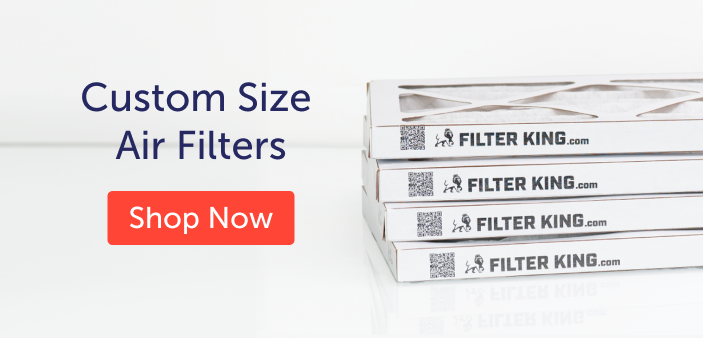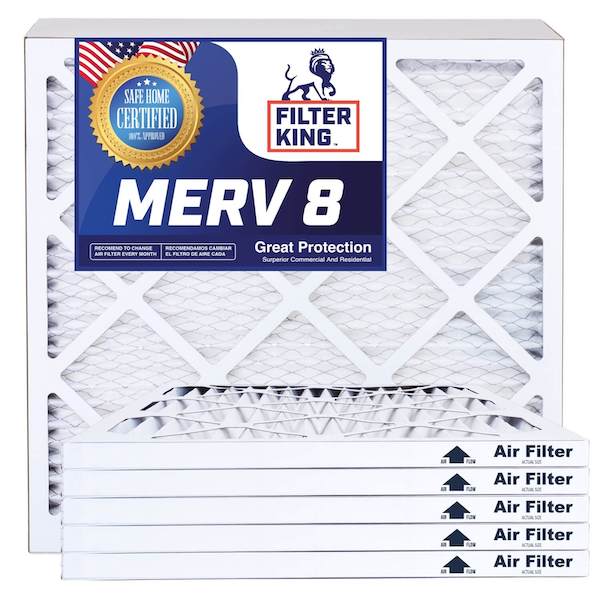Find The Best Air Filter For Your Home AC [2025 Review Guide]

You know it’s important to change the air filter for your home. Chances are, you have a filter replacement for your AC at least thrice a year, at least homeowners should. Whether you’re getting ready for summer air conditioning or heat in the winter, your filter affects the air quality in your home. Before you grab the first inexpensive air filter at the store, here’s what you need to know.
Best Air Filtration For Your Home
Dirty AC filters not only reduce air quality but also affects your energy bills. Clogged filters reduce airflow, making your HVAC system work harder. Low airflow means your AC is running longer and more often, causing a spike in your utility bills.
The best HVAC air filters for the home fit your system perfectly. You don’t want gaps around the edges or a filter that’s bent to fit inside. Thicker filters are better equipped to prevent dust, pollen, and other allergens from getting into the air you breathe at home.
Know This Before Buying
You need to know a few things before buying air filters for your home’s ac. It will ensure you get the best home air filter that will also last through the season.
Filter Type: Not All Filters Are Created Equal
There are several types of home HVAC filters, and not all are created equal. Materials vary, along with other factors, such as high-efficiency. What works great for your neighbor may not be the best air filter for your home furnace.
Pleated vs. Fiberglass Filters
Fiberglass air filters are easy to find and are usually affordably priced. The flat design is adequate at filtering out particles, and you throw it away when it’s time for a replacement. Initially, you will save money. The filters are cheaper than some other types. However, you will have to replace it more often. Some of the best ac filters are pleated. Pleated or folder air filters are less porous than flat ones. You will pay a little more, but these filters also trap more airborne allergens. You still want to change the filter every six months, but it will work longer than a fiberglass one.
Disposable vs. Washable Air Filters
Eco-conscious consumers may want to opt for washable air filters. You are reducing your carbon footprint, but there is a downside. Reusable filters aren’t designed to trap small particles. You’ll still breathe in allergens in your home.
The best house air filters are disposable. While washable ones will filter out dust, disposable ones also trap smoke, bacteria, and pet dander. You’ll breathe easier at home with a quality disposable air filter.
HEPA-Type Air Filters
Chances are you’re not using true HEPA filters. These medical and industrial-grade air filters are expensive and aren’t always designed for home use. You can boost indoor air quality with a true HEPA air purifier. These filters are priced higher but are worth it to prevent allergies and bacterial viruses.
HEPA type air filters do not trap 99.97% of airborne particles, but they come close. Only true ones meet the exact standard. Some of the newer and high-priced HEPA-type filters can trap up to 97% of dust, smoke, and allergen particles. However, before you buy one, carefully read the manufacturer’s specifications to see if it is a true HEPA air filter.
MERV Rating: What Are You Filtering Out?
The minimum efficiency reporting value (MERV) refers to the air filter efficiency. The higher the MERV rating, the better the filter is at trapping large and small particles. The MERV rating also denotes the filter’s use. Air filters with lower ratings are typically found in commercial and residential buildings, while higher rated ones are used in hospitals and industry settings.
MERV Rating 1-6: Pollen, Dust Mites, Carpet Fibers, etc.
Air filters with MERV ratings ranging from 1-6 trap particles with a 10.0-micron size and larger. They are often used as a pre-filter in commercial buildings to provide staff with added protection. You can also find these air filters in window ac units and residential furnaces.
MERV Rating 8-13: Fumes, Smoke, Mold, Dust Mites, Smog, etc.
Depending on the type of industry, these filters are used in both commercial and residential structures. They can filter out particles with sizes from 3.0-10.0 microns. Dust from sand and cement work is trapped in the filters, along with dust, dust mites, mold spores, and carpet fibers.
MERV Rating 14-20: Bacteria, Viruses, Odors, etc.
These are the best air filters, very few microscopic particles get through. Hospitals, operating and smoking rooms all use this type of filter. It is able to trap particles as small as 0.30 microns. They will also filter out carcinogenic and radioactive materials. These are industry quality air filters and are rarely used in the home.
Health
The air you breathe does affect your health. It’s why you want the best air filter for your home.. You’ll find the same pollutants indoors as you do outside. Every time you open a door or window, you’re letting airborne particles in.
Allergies, Asthma, and Other Breathing Problems
You can’t purify the outside air, but you can do something about it inside. Installing and maintaining your ac filter is the best way to improve indoor air quality. The best air filter for your home ac eliminates the particles that irritate existing breathing conditions like pet dander, dust, mold, tobacco smoke, and other allergens.
Frequency
How often you change your home’s air filter matters. Filters do get clogged, slowing down airflow and letting allergens pass through. Some people only change their air filters twice a year, typically in the summer and winter. However, it might not be often enough.
30, 60, or 90 Days Replacement Duration
There are a few factors to consider when you’re deciding how often to change your air filter. If you don’t have pets or allergies, once or twice a year is fine. Otherwise, you want to plan on replacing the air filter more frequently.
- 90 Days: You should switch out your air filter every 90 days if you don’t have pets, but more than one person lives in the home.
- 60 Days: People with one pet and/or allergies will want to replace their air filters every two months.
- 30 Days: Anyone with multiple pets should change their air filter once a month. It also applies if someone in the home suffers from a breathing condition.
Price
You can find inexpensive, disposable air filters under $5, and there are also some that are closer to $100. The type of air filter does affect price, along with quality. You don’t have to spend a lot of money on the best HVAC filters, but you also don’t want the cheapest ones.
Top 5 Air Filters
There are plenty of air filters for home ac units, but not all are able to trap tiny particles. Here’s a look at 5 of the best HVAC air filters for home use.
Filter King MERV 8 HVAC Pleated AC Furnace Filters
One of the best air filters for home furnaces is the MERV 8 HVAC Pleated AC Furnace Filters will help you breathe healthy indoors.
Best For: Mold and Pollen, Allergen Reduction & Increases Air Quality
Pet owners and allergy sufferers will breathe easier indoors when they install these air filters from Filter King. Designed to filter out particles 10.0 microns and larger, you don’t have to worry about breathing in dust, mold spores, and even smoke.
Product Benefits
The primary benefit you get with these filters is improved air quality. They effectively remove dust, dander, and smoke from the air. Pollen is also trapped in the filter, so allergy sufferers can breathe easier.
Pros and Cons
Along with improving air quality, the air filters are also a difficult size to find. It’s not a standard size, so some consumers have difficulty finding air filters that fit their HVAC systems. Since the filters come in a 4-pack, it is more cost-effective in the long run. The downside is these air filters are priced higher than some competitors.
Rheem Basic Household Pleated FPR 4 Air Filter
Overview
These air filters trap lint, dust mites, allergens, and pet dander, thanks to their pleated design. Even though some microscopic pollutants may get through, the filters are still ideal for home use. They’re also designed for easy installation. Simply slip them into place after removing the old filter.
Product Benefits
Removing pollutants like dust, pet dander, and pollen from the air is always a benefit. You’ll breathe more easily and experience fewer allergy attacks. Anyone with breathing problems like COPD will find that they’re using their inhalers less often when they’re at home.
Pros and Cons
These are some of the best HVAC filters when it comes to price. They are also effective at improving air quality in your home. The downside is their design. The filters aren’t able to trap small particles like cement dust, paint fumes, and smoke.
FilterBuy MERV 8 Pleated AC Furnace Air Filter
Sometimes you need to spend a little more to get the best air filter for your home ac, especially if you have more than one furry pet.
Best For: Pets
Even short-haired pets leave dander behind that gets into the air. These are some of the best air filters for home ac systems. Once installed, you’ll notice a difference in air quality.
Product Benefits
The filters are pleated to trap more pet hair and dander in, along with other allergens. The MERV 8 rating ensures that particles larger than 10.0 microns won’t get into the air. With the ability to trap up to 90% of airborne particles, you may find you need to take your allergy medicine less often at home.
Pros and Cons
The only real drawback is the price. These aren’t cheap air filters. You can save money by purchasing the filters in bulk. You can get a pack of 12 that will last for a year. The filters are easy to install and will block up to 90% of pollutants from getting into the air.
Filtree Micro Allergen Defense AC Furnace Air Filter
Affordable and effective, these are some of the best house air filters for the price.
Best For: Asthma
Asthma is a serious breathing condition, and most sufferers rely on their inhalers to get through the day. The slightest pollutant can set off an asthma attack and it can be life-threatening. Installing a micro allergen defense ac furnace filter will help prevent these attacks from occurring at home.
Overview
One of these air filters will last for up to 90 days. The pleated design traps dust, dander, mold, and pollen, effectively reducing your asthma attack chances.
Product Benefits
The filter’s ability to capture small particles ensures that you can breathe safely at home. It also lasts up to three months, so you don’t have to change the filter as often.
Pros and Cons
If you’re looking for the best house air filters that are easy to install, you won’t have any problems with Filtree. They’re also effective at blocking most asthma causing allergens. The downside is the filters do let microscopic particles through.
Nordic Pure Pleated MERV 13 AC Furnace Air Filters
Smoking doesn’t only affect the person with the cigarette or cigar, but also everyone around. Best For: Cigarette Smokers
Smoking is a popular hobby, but it doesn’t produce great air quality. You need a filter with a MERV rating that will trap the fumes and carcinogens.
Overview
These pleated filters come with a MERV 13 rating. They can trap fumes and carcinogens from cigarette smoke before it reenters the air. The 3-pack is priced higher than non-MERV air filters, but it is worth the price if there’s a smoker in your home.
Product Benefits
Removing cigarette fumes and other pollutants from the air is always a benefit. You’re improving your health with better air quality while also helping your home to not smell like a chimney.
Pros and Cons
Like any other products rated as the best ac air filters, you can expect to pay more. You do get improved air quality, and this is important for everyone’s health in the house. Residual cigarette smoke is a cause of lung cancer and other health problems.
If you want the best air filter on the market you want the Filter King MERV 13
This is the best filter hand down if you have Kids, Pets, Allergies.
This filter actually attracts dust.
Overview
This filter has double the number of pleats than your average filter.
Product Benefits
It captures particles that flow through usually 3-10 sized microns. The titanium also has electrostatically charged fibers that capture microscopic allergens smaller than 1 micron.
An electrostatic filter is a filter made with media that undergoes a process to “charge” it, thereby creating that attractive quality.
Click here to see all our Titanium Merv 13 sizes
Benefits of Air Filters in Your Home
Some of the benefits you’ll notice when you install the best air filter for home ac are,
- Relieves asthma symptoms
- Neutralizes odors
- Eliminates harmful airborne chemicals
- Traps virus causing bacteria.
- Improves sleep quality
Improving indoor air quality can also help you live a longer and healthier life.
The Difference Between Air Filters & Air Purifiers
The goal of air filters and purifiers is the same, to improve air quality inside your home. How the two products accomplish this does differ. Filters collect and trap particles that flow from your HVAC system into the air.
Purifiers also improve air quality. Instead of trapping the particles, an air purifier emits negative ions that neutralize the containments.
Changing A Furnace or AC Air Filter
It’s not hard to change your HVAC filter, though you will need to follow a few steps.
Locate Your Filter
Your old filter is usually located behind a panel, either in the wall or on the HVAC unit. If you’re having problems finding it, a professional HVAC specialist can give you advice.
Get The Right Replacement
Not all ac units and furnaces take the same size air filter. Before you buy the first top-rated one you see, double-check the size.
Installing The New Filter
Most HVAC systems are designed so that installing new air filters is a breeze. Most slide into four brackets that hold the filter in place.
Filter King: Best Home Air Filter Delivery Service
When you’re serious about regularly changing your home’s air filters, it helps to have a reliable delivery service.
Premium Air Filters
When you order your air filters through Filter King, you’re getting a premium product. The company only provides its customers with the best air filters for home ac systems.
100% Made in the USA
All air filters sold by Filter King are made in the USA. You can rest assured that you’re getting a top-quality product.
Fast Shipping Guaranteed
When you place an order for the best ac filters with Filter King, you can rest assured that your delivery will arrive on the scheduled date.

 14x18x1
14x18x1
